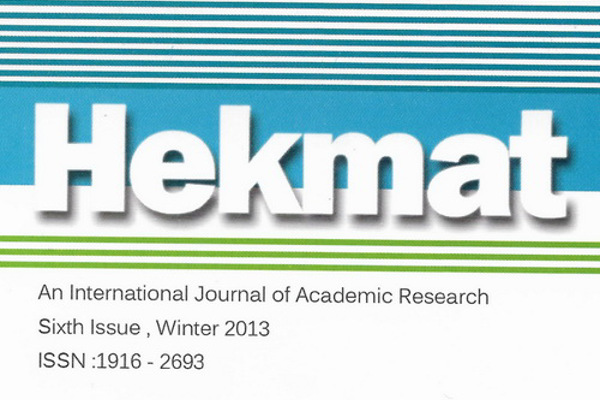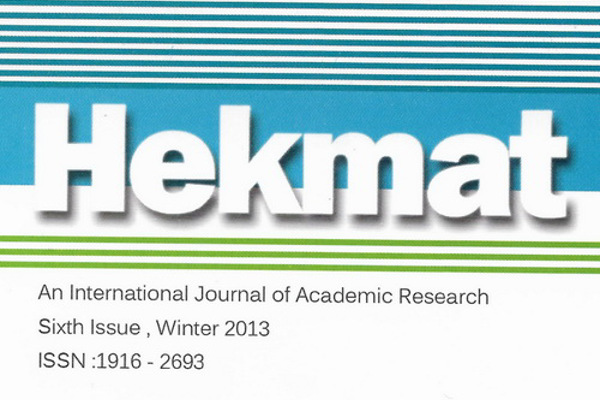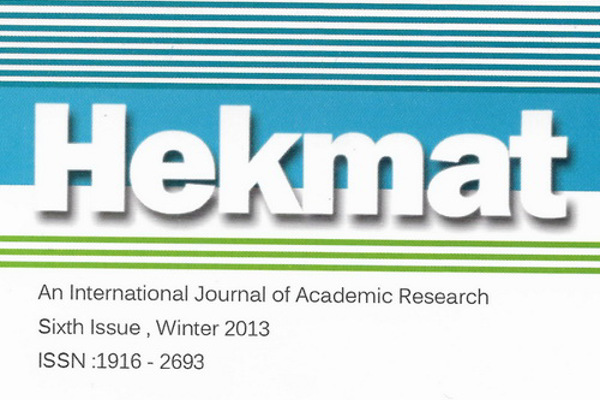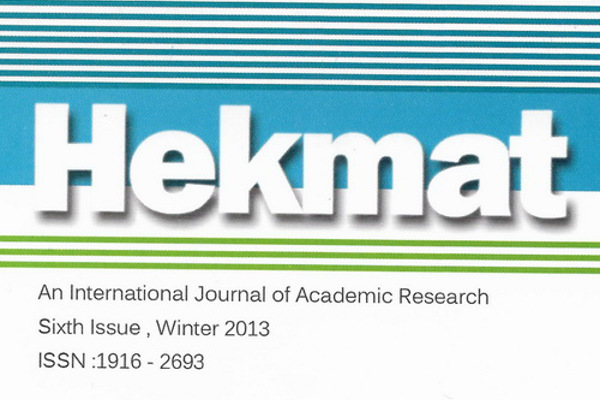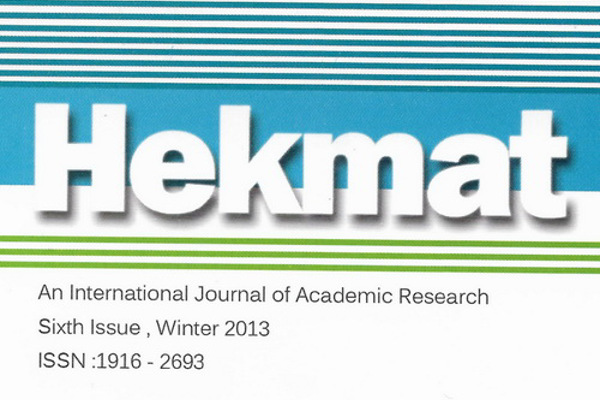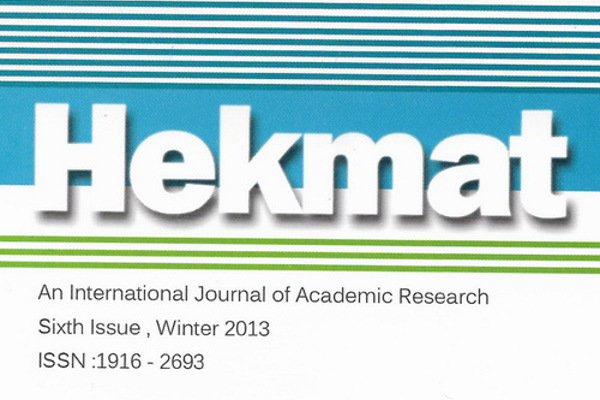Religious Ideology and Environment An Introduction to Islamic Approach to Nature / By: Behnaz Aminzadeh Ph.D.
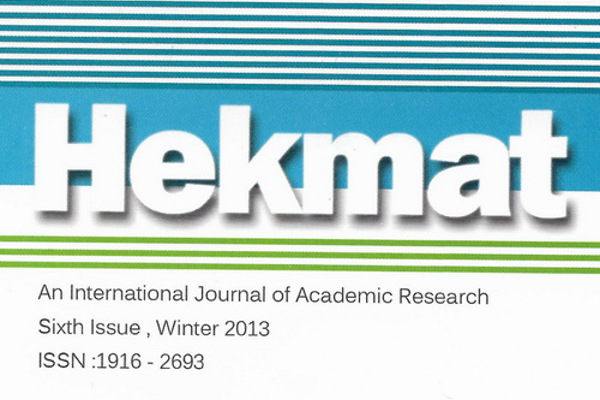
Religious Ideology and Environment
An Introduction to Islamic Approach to Nature
By: Behnaz Aminzadeh Ph.D.[1]
Abstract
Environmental crises threaten the entire nature. While present debates in international forums, conventions, and organizations as well as national ones the world over are centered around environment and how to sustain it, destructing the environment through rapid increase in energy consumption on global scale, the extinction of natural species and devastation of forests continue. Many international conventions address strategies and solutions for environmental problems, and states are dedicated to work them out. Now, the question is: why noticeable improvement in patterns of environment protection such as change of the consumption pattern, replacement of fossil fuel by renewable energy sources and economy in utilization of natural resources is not seen despite the more appropriate patterns of sustaining environment in all respects being available and recommended? Maybe several answers to this question are conceivable but if we delve into the issue more profoundly, we will reach a very fundamental point that causes all these troubles and that is neglect of the spiritual aspect of man’s relation to his environment.
This paper investigates the reasons why present civilization overlooks spiritual aspects of ecology and tries to highlight the role religion can play in environmental policy making, emphasizing the necessity to throw light on man- environment relation as a prelude to controlling and solving present crises. The case study here is focused on the essential dichotomy of humanism stemming from Divine religions and humanism based on modern philosophies with emphasis on Islam as an ideology.
Key terms: religious thought, environment, ecology, ecological policies, humanism, Islam, natural laws
Prelude
It is more than three decades now that debates about religion and environment have been going on in scientific and research circles worldwide. Proponents and opponents of the controversial doctrine proposed by Lynn White in 1967 about “the historical roots of present ecological crises” being the Christian-Jewish traditions still forcefully pursue their argumentation for and against it (Toynbee, 1972; Singer, 1999). In recent decades, the continuation of ecological crises has led to a noticeable change in approaches to religion as an effective factor in meeting the challenges posed by the crises all over the world. A great number of environment enthusiasts nowadays believe that ecological policies must be not only comprehensive but also supplemented by ethically and religiously cultural support in order to be implementable. This cultural support is in fact the pillar of any plan for environment protection. Proponents of this doctrine hold that the historical role of religion in environment preservation is strong evidence to the fact that protection of nature has become difficult due to the loss of the spiritual ties to nature. Consequently, the factor of religion must be taken into account in ecological discussions and some religious base is indispensable for any solutions for the ecological crises (Simmons, 1993; Kula, 2001). The Moscow international conference (1990) emphasized the need to include the connection of science to religion in endeavors to solve ecological problems, present new definitions for science and technology, and provide a religious foundation for man’s work on this planet[2]. The ten Conferences held in Harvard University between 1996 and 1998, and the ensuing three conferences in Cambridge Academy for Arts, the United Nations, and New York Museum for Natural History respectively for summarization of conclusions of Harvard conferences recommended efforts to highlight commonalities between religions regarding ecological issues and how to utilize nature, and emphasized the need for propagation of religious culture via preparing the ground for the effective exchange between religion and other relevant sectors.
The role of humanism on the process of destruction of nature
The present ecological crisis reflects the inner pain and illness modern man suffers from. Modern man turned his back to the heaven in order to gain the earth, rendered the earth the prominence to the heaven though began finally to lose the earth too just for this very reason (Nasr, 1377-78). Modern man makes laws, produces values, and relies on no power besides him. Thus, he has become the center of the world. The roots of such a view of man and the world can be traced back to the ideas held by authors like Pythagoras who considered man as the criterion for truth. Yet, it was during Renascence, when science rather than wisdom developed qualitatively and turned into the sole criteria by which everything including culture and faith was examined, that humanism acquired the material tinge as well. There are two factors responsible for the emergence of humanism in its modern form.
1. Scienticist approach to nature
Traditional man attached a tinge of sacredness to nature irrespective of the faith and creed he belonged to and the geographical location he lived in. Water, trees, mountains, and many other natural phenomena were highly esteemed by man. The oriental man thought that any interference with nature was a sin. As civilization started at thirteenth and fourteenth centuries with all its manifestations, however, the outlook to nature as a factor for man’s salvation began to lose strength and respect for nature as hitherto a vital reason for its protection, gradually disappeared. Thenceforth, a new philosophical outlook emerged that understood the world through concepts representing a dualistic hierarchal order i.e. soul and matter. Like Plato, Descartes too believed that nothing beyond what valid scientific method proved to exist existed. Nature was composed of measurable tangible quantities such as weight and shape alone. Intrinsic values which were immeasurable like beauty were rendered insignificant. Descartes’ revolution marked not only the separation of philosophy from religion but also the emergence of reason as the foundation of philosophy[3]. This revolution was the prelude to the birth of modern science, Galileo, Kepler, Newton, and other fathers of science founded. They developed a system based on experimentation, observation, and atomistic strategy in which there was no room for respect for nature. Nature was now seen as a vast laboratory where theories were to be tested. Science founded on empirical experimentation started to be seen as identical to power since Francis Bacon. Even Bertrand Russell based his utopia on this foundation and baptized it as “scientific society” (Nasri, 1363). This outlook, fortified by glorious achievements of technology in recent centuries, gave birth to an unshakable trust in science hence its emergence as the sole and absolute criterion. Scientific ambitions of man led to the illusion that science was to replace everything else and cure all wounds of society as an elixir.
2. Man’s divorce of nature and dominion over it
Plato and Pythagoras introduced two different systems of thought which incorporated into the doctrine of man’s separation from nature. Both philosophers believed in body/soul dualism and thought that the physical world is but a snare where man is imprisoned. In its development in the renascence period, this vision enhanced the separation of man from nature and generalized it to all aspects of life and emerged in the form of modern humanism and the approach that considers man the center of the world. The radical distinction of man from everything else propounded by thinkers like Pascal, Kant, and Aristotle amounts to the assumption that only man is rational hence their legitimate dominion over all creatures due to their superior power.
The important message of rationalism was manifested in considering nature as a machine by Kepler, Descartes, and their followers. They saw nature as a huge machine functioning according to a set of fixed laws with no creativity of its own. Belief in matter as a being that undergoes no change and enjoys no intelligence hence no value of its own served to acquit man of any crime or sense of guilt when inflicting damage on and harming natural ecosystems. Francis Bacon emphasized the idea that knowledge means might, and power endowed by science can affect technical might over nature. He called to exercising control over nature; changing it according to the needs man and his desires define. One repercussion of this outlook is to seize respecting Mother Nature and diminishing it to the level of raw material for man’s consumption. Some famous theories in social sciences emerged later which were based on this outlook. For instance, the founder of modern liberalism, Luck, holds that nature is worthless and land lacks any intrinsic value. Only after man’s utilization does land acquire value. Even after development takes place, it is the labor that is considered as the ultimate worth (Gillespie, 1997). Marx too believed that only material entities exist, value stems from production means, and nature is void of intrinsic value.
The effect of humanism on ecological policies
Atomistic approach, scienticism, separation of man from nature, and zeal for dominion over nature plus the present style of value ascription led to modern man giving priority to matter and consider comfort and livelihood as the ultimate ends of life. This ideology affected ecological policies via basing them on humanism and human interests.
Thinking that man is the sole intelligent, creative, and producing force in nature leads man to proclaim the right to care for nothing except himself. This fact becomes obvious when we glance at numerous conferences held with subject matters relevant to sustaining environment in which preservation of environment is defined in terms of protecting the present and future generations. For example, in protective strategies adopted in 1980, sustainable development is defined as a sort of development that incorporates the use of natural, financial, and human resources for meeting human needs and betterment of the quality of life. Preservation of nature in modern sense includes managing man’s utilization of lands in a manner conducive to stability for the present generation and meeting future generations’ needs[4]. The World Conference on Environment and Development in 1987 defines sustainable development in terms of a process that guarantees meeting the needs of present man without diminishing chances and capabilities of future man to meet their needs[5]. The UN Rio Conference in 1992 interpreting sustainable development stresses on a policy that guarantees the continuation of benefiting from profits gained through consumption of natural resources by man in predictable future. The 21st agenda emphasizes the necessity of taking measures to coordinate population growth with their needs and limited resources available on the earth.[6] Such views amounted to looking at man as the most creative, most productive, and most valuable of the resources in “peace and food” report of 1994[7].
When man is the focus of attention in ecological policies and humanism plays the role of the sole foundation of strategies for environment preservation, it is reasonable to expect that nature and environment be demoted to the rank of pure means. Amidst this mess, economists particularly stress on the role of environment and ecology in economic management and dislike any interference with ecosystem from the point of view of the possible impact its development may leave on protective systems that guarantee economic stability in future (Rao, 2000). In fact, the problem stems from the shortcomings in definitions of sustainable development in various fields. Therefore, notwithstanding emphasis on protective strategies, safeguarding future generations’ capability for utilizing resources, betterment and adaptation to environmental conditions, the moral spiritual aspects of ecological issues are undermined despite their undeniable role in the emergence of ecological crises because attention is merely focused on material aspects of the problem and this is due to the dominant world views in the present era.
Humanism has led to neglect of the responsibility man has towards nature in safeguarding its intrinsic values. Instrumentalist valuation of nature follows the principle of meeting human needs and is dominated by other humanistic justifications. Among them are stress on future generations’ rights, debates about endangering the health of the inhabitants of this planet, manipulation of logic of economics and even religious discourse in order to protect the environment.
As to religious discourse manipulated for justification of humanistic approaches, it is noticeable that some theories say it is religion which is primarily responsible for the spread of the idea that man is distinct from the rest of nature, enjoys the right to utilize nature, and is the lord of the world for whose sake everything in the universe is created. Western religions such as Islam, Christianity, and Judaism are blamed on this account. White (1967) and Toynbee (1972) studied the historical roots of ecological crises and blamed religion for them. Their position is somehow extremist but they think Christianity and Judaism invite to free and unrestricted utilization of nature thereby bringing about ecological problems that we now face. White includes Islam and Marxism too in the list of creeds to be blamed because they too follow the lead of Christian and Jewish traditions. There are authors, however, who think “the Jewish and Christian sacred books do not contain unjustifiable statements regarding man’s relationship with nature. The interpretations are incorrect” (Mohaqeq Damad, 1373).
Although ecological policies are all based on humanism, we ought not to overlook scattered and teeny attempts to involve religion directly or indirectly in making ecological policies. In theses attempts aimed at preservation of environment, metaphysical notions are often used. As an example, the World Conference on National Parks in 1962 stated in clause four: “it is vital for man’s life to protect the beauty and original features of natural sceneries because the renewed influence of spirituality produces firm physical and mental strength [8].” In the final declaration of the said conference in 1983 and in the Conference on the Earth in 1992, references were made to this very point. The World Association for Management, Preservation, and Sustainable Development of Forests states that the task of preserving, and sustainable development of forests must include ecological protection of all national forests which embody unique values as spiritual and religious manifestations. In directive no. 21, the same theme reappears where understanding religious concepts and common cultural views are introduced as a factor conducive to protection of biological diversity (Bilderbeck, 1992). In addition to this, UNDP indirectly uses information about different world religions in environmental studies.
Two approaches can be discerned in present attempts to see the connection between religion and ecological debates. The dominant approach sees religion as a particular subject matter to be considered by all disciplines that somehow connect to managing ecological crises such as sciences, economy, education, and public policies (Tucker and Grim, 1998). The other approach emphasizes the protection of local cultures and religious liberty in order to prepare the ground for revival of religious culture in society which in turn contributes to preservation of environment through drawing attentions to nature and natural world (Gillespie, 1997). Comparing these two approaches with one another, it seems that the latter one is more efficient so long as establishing a connection between religious precepts and ecological policies is concerned. Because, in this approach, religious thought is seen in more concrete terms and comprehensive an outlook in regard to introduction of ethical values pertinent to environment and nature while the former approach regards religion in more abstract terms to be subject of investigation in various branches of science each of which naturally attends to it from a special angle and to a certain degree. Yet, the preferred approach still requires refinement, further understanding of religious culture and deployment of strategies which in turn needs comprehensive studies on man-nature relations to draw.
We mentioned earlier that theistic faiths are blamed for their incentivizing man to freely use the natural environment in humanistic air. Islam too is blamed for the same reason as one of the religions of the Abraham dynasty next to Christianity and Judaism. However, we shall later see that Islam forbids disturbing the natural order in the environment and charges man with the obligation to protect it from contamination and decay and to enhance it qualitatively.
Islam and Environment
Religion and environment can be seen as two independent issues that pertain to two distinct realms. One relates to beliefs and world view one holds and the other denotes material activities man involves in. But if we consider the hidden spiritual aspect of the concept environment from the Islamic point of view, then we can see why Islam opts for a sort of unification of the two concepts in a particular sense.
One of Divine names is “Mohit”. The Quran describes God in several verses as Mohit i.e. He knows everything[9]. These verses say that God is the genuine environment and man is ever floating in this sphere, that is, we can claim that our environment is the very Divine environment without committing ourselves to pantheistic doctrines or mystical idea of unitism. But man is unaware of this fact. Or he neglects it. Crisis and ecological degeneration starts whence man overlooks the sanctity of the environment he lives in. Nowadays, people think their environment is separated and independent from him and even from Divine environment (Mohaqeq Damad, 1373).
Islamic precepts as a whole constitute a system of norms conducive to the progressive move of all beings including human beings towards their perfection. In this system, ecological considerations as such legitimate ways of utilization of resources, the correct interaction between man and nature and on the top of all, human vision of him and of the world and the relation between them are addressed carefully reserving the right for not only human beings but also animals, plants, and even inanimate beings. It is beyond this paper to discuss all these issues and study all topics relevant to man and environment and their interactions. Therefore, I shall try to concentrate on man’s relation to environment from the Islamic perspective. In this study, the attitude Islam takes towards nature will also become obvious.
If we consider any of the purposes of creation from the Islamic perspective, we arrive at the conclusion that the ultimate purpose is to worship God. In order to attain this end, it is necessary to clarify the activities man has in relation to nature. This relation has several stages including the purpose of the activity, the method of dealing with nature, and the way the relation to nature is implemented. A glance at religious texts shows us that we can sum up these stages in this manner: to contribute to the perfection of nature, to try to know nature, and to construct and repair. This means that from the Islamic outlook, our contact with nature and use of natural material ought to pursue the aim of contributing to their perfection. The method of this contribution is to try to understand the nature and know its parts and the relationship between them. The way to effect this contribution is to mean construction of the earth and fixing what has gone wrong.
Contribution to the perfection of nature
The special attention of Islam to nature can be seen in so many words pertinent to nature that uses, naming several parts of the Quran after natural elements, and the Quran swearing on some natural phenomena when trying to emphasize some facts it states. Mountains as the locus of Divine manifestation[10], birds as Divine army[11], sea as the source of endless bounties God gives as gift[12], and trees as the medium in the communication of God and Moses[13] can be seen in The Quran. From the Islamic viewpoint, all beings, whether animate or inanimate, deserve to be respected. Whatever looks inanimate and dumb to us possesses another dimension from which it is alive and capable of speaking since it has a face turned to God. This is because everything on earth and in the heavens and betwixt them are engaged in eulogizing God, and all creatures including trees and stars worship God in prostration[14]. So, the smallest task of man is to refrain from destructing and contaminating nature and natural elements.
Destructing or contaminating the environment hinders man’s journey to the heavenly world and obstruct his passing from the inanimate level of nature to the inner depth of the phenomenal world. Thus, from the Islamic perspective, man’s interaction with nature must not merely aim at taking advantage of it but must also contribute to the persistent move of all beings towards perfection. As Allameh Ja’fari (1981) says, all beings ought to be led to perfection in proper manner. He adds that, among so many different schools of thought that propose world views, no school is found that explicitly denies the movement of beings towards perfection. In this framework, the Quran says that nature as a whole is a complete system every part of which protects other parts. “It is inscribed in the inner structure of every being that it must move within the existential order peculiar to it so that if it deviates even a bit from the direction set for it by other parts of the whole, it disturbs the total order. Thus, when deviation occurs, other parts of nature stand up to correct the mistake and force it to return to the normal course that suits all in their defensive attempt to protect themselves. If the deviated element does not yield to this corrective drive, then the devastating forces in nature personified in calamities befall it and ultimately smash it. This is one of the general laws of nature,” (Allameh Tabatabtii, 1984).
The principle of perfection seeking applicable to all creatures according to Islam requires that all human activities be carried out in a manner that they aim material and spiritual progress of the agent to perfection and, at the same time, contribute to other creatures moving towards their perfection. Man’s task is to use natural elements in a way beneficial both to him and to them. Therefore, stagnation is not recommended for a thing, space, and meaning. All processes and activities ought to imply perfection seeking with reliance on the sublime spiritual purpose of worshipping God. In this perspective, the ultimate goal is not to construct for living. Environment too must always attain perfection; that is, it must acquire a better state at any moment compared to the past. We can conclude that when we change the shapes of materials from the raw status and use the land, we ought to do this in a way that those materials and lands too change to a better shape. This is a heavy responsibility on the shoulder of planners and interpreters. The principle of perfection seeking also highlights the necessity to revise and evaluate, and emphasizes the role evaluation plays in the betterment of the products and correcting their defects. The scope of this principle covers every activity even teeny actions. The simplest physical act man performs ought to be motivated by the drive for perfection. There ought to be a holy purpose, the mentality of perfection seeking and a spiritual incentive for every human voluntary action. Imam Ali (be peace upon Him) says that remaining in one state for two days i.e. failing to progress is a loss by itself. It is a vital need of life as life to constantly grow to a better state. If such a view is applied to policy making in the present age, we shall see that preservation of the environment alone will not suffice. The policies must incorporate the betterment of the environment too.
Understanding nature
Understanding nature and exploring natural laws mean recognizing “Islam” and learning how to submit to Divine will. According to the Quranic teachings, all creatures except human beings are Muslim by nature i.e. submit to Divine will instinctively and involuntarily. No creature can riot against its natural dispositions. Among human beings, those who submit to Divine laws are Muslims (Bakkar, 1373). For a Muslim, the laws of Sharia resemble natural laws in that they both pursue establishment of order in the universe. Sharia laws prescribe what a Muslim ought to do to him, to society, and to the environment. The overall harmony in the universe is realized when man voluntarily abides by these laws in the same way that compulsory obedience of creatures other than man to natural laws guarantee the cosmic order to persist. The comparison between natural laws and laws of Sharia shows why one cannot count himself as obedient to Sharia Law while he disturbs genuine cosmic order by braking laws and hurting nature.
Islam empathetically encourages man to contemplate on nature, its parts and elements, laws and order prevalent in nature as a method of acquiring knowledge. The Quran describes the natural world as a whole as a sign and icon that can help man understand what lies beyond the world of nature (Motahhari, 1988). Avicenna too believed that the study of nature should not be confined in investigation of phenomena and relations among them. It should include investigation of the apparent entities in the light of their relations to hidden realities; studying selected individual things in the light of their relation to the whole (Nasr, 1980).
For this reason, natural sciences in Islamic world have always included a mysterious and internal aspect just like divinity. So, many outstanding world scientists were Muslim like Avicenna, Razi, Jaber bin Hayyan and Jahez. Their view of the world as a Devine sign prevented the emergence of secular science among Muslims (Nasr, 1377; 78). Due to recent developments in modern physics and the path experts in various branches of science especially philosophers have chosen, world scientific movement is now in a direction that will soon display the reception of the theists’ scientists and thinkers worldwide. For example, the atomistic approach and Newtonian sciences that dominated on the thought and philosophy of other branches of human sciences for a long time is now withdrawing and giving its place to holistic approach which is the result of monotheistic thought of Islam. This process will eventually leave a positive impact on human vision and arrangement of human activities and their relation to environment and nature.
Refinement and construction of the earth
Mankind is endowed with value superior to that of many other creatures and given control over the world according to Islamic world view[15] but the man so chosen is not the man who knows no responsibility. This man is appointed as the Divine viceroy on the earth and is charged with the responsibility to carry God’s trust on his shoulders[16]. In humanistic view, man has replaced God so he is not His vicegerent. However, the position of vicegerent of God makes man try to assimilate his behavior with the Lord’s. So, man ought to imitate Divine attributes of action in his life in order to remain loyal to his pledge as viceroy.
Man is but a virtual owner on this planet; God being the genuine owner. Conditions for benefitting from this property virtually owned are set in several The Quranic verses[17]. They can be summed up thus:” reforming and avoiding any damage and corruption”. The Quran forbids spreading corruption in the world and orders man to work for fixing what has gone wrong. One way to refine the world is to build. “ … He is the God who created you from soil and charged you with the task of constructing the earth…[18]. To construct, man must obey the laws governing nature for, man with his body and soul, as the minor world is a part of the major world. Consequently, if human activity coheres with the order that governs nature, it contributes to his betterment of life and hinders him from causing any damage or corrupting nature. Such a view recommends proper and balanced utilization of natural wealth and does not allow wild and destructive dominion over nature.
The Quran considers wasting or destructing environment as a kind of transgression. Whoever commits breach of Divine pledge through causing corruption, wasting or transgressing their limits will be doomed and deprived of Divine merci[19]. This is why The Quran has so strongly prohibited extravagance and wasting and so empathetically invited to moderation[20] . Waste and extravagance are not confined to excessive consumption and damaging resources. They also include cases where proper and best utilization of resources and raw material is not carried out and cases where utilization is not accompanied by process of perfection of the material consumed. As a matter of fact, every instance of disturbance of the normal natural processes is a consequence of human interference and excessive manipulation by man. Disorders and bottlenecks we now see in nature stem from improper use of natural environment by man. The Quran emphasizes that the world is ruled by an order and a design, it is coherent and based on justice, everything is created according to the plan that contains exact measures[21].
Conclusion
A glance at the impact of contemporary humanistic views on the process of destruction of nature shows that the present crisis will continue so long as the sheer scienticism remains dominant, dominion over nature void of any sense of responsibility is sought, nature and its parts are valued as sheer means and aspects of human life and needs including the spiritual and the physical are seen separately. In spite of all great achievements of human endeavor to know and preserve the environment, we can say that man has not yet understood which path to take. Maximum outcome of past crusade is to come to know that so far man has gone astray. Many analysts of ecological issues believe that we cannot find the correct path unless we found firm ethical and spiritual pillars for reviving human- nature relation. Under such circumstances alone separation of man from environment and material aspect from spiritual aspect will stop.
The greatest challenge religion faces now is how to play its role effectively in solving ecological crises when secularism has so widely spread in society. The majority of recommendations as to incorporating religion into the enterprise for ecological policy making and implementation; including the idea of invoking religious commonalities have yet remained untried. So are the strategies so far adopted such as defining projects for connecting policies of implementation to policies for reforming moral standards aiming at guidance of human behavior to proper interaction with nature. Still we can hope for some progress in formulating clear principles about human dealing with nature via relying on common religious values and norms that can form a basis for ecological policies and comprehensive assessment of man- nature interaction. It is noteworthy that such principles cannot be implemented unless radical economic and political changes take place.
The fact that in the East religious beliefs and local norms and values are stronger, does not entail that eastern societies suffer ecological problems less. There are two reasons for this. Ecological crises are globalized. The majority of these societies have been, in the last two centuries, afflicted with a destructive influence of western modernism that has made them totally forget the rich traditional beliefs and norms regarding interaction with nature they have in their culture. Muslim societies too are overwhelmed with western culture so widely that valuation of material progress alone has virtually shaken their local traditional ethical value bases and the philosophy of life Islamic world view proposes is breathing last. Thus, it is incumbent on all individuals in these communities to revive religious thought and explore Islamic values again.
Islamic vision of man-nature relation is vivid and different from the West’s. We can prescribe our own pattern of sustenance and stability via studying relevant Islamic teachings and considering issues like understanding natural order, attention to refinement and construction of the earth, caring for betterment and perfection of environment both natural and artificial as man’s grand responsibility. This pattern can open the way for making general policies governing Islamic Society. To implement such policies, proper grounds are needed which can be paved through establishment of social justice. The holy Prophet of Islam says: “it is via justice that the heavens and the earth continue to exist”.
Bibliography
- Bakkar, Othman, 1373, Unification o f science and spiritual Knowledge in Islam, Translated by Fatemeh Walyani, Nameh Farhang, Vol. 4, No. 1, p. 40-51
- Jafari, Mohamad Taqi, 1360, Exegesis, Commentary and Analysis of Mathnaei, vol. 2, Islami, Tehran
- Tabatabaii, Seyyed Mohammad Hossein, 1363, Tafsir al Mizan, vol. 20, Mohamadi Publication co., Tehran
- Mohaqeq Damad, Mostafa, 1373, Nature and Environment from Islamic Perspective, Nameh Farhang, Vol. 4, No. 1, 78-79
- Motahhari, Mortaza, 1376, The problem of Knowledge, Sadra Publication co., Tehran
- Nasr, Seyyed Hosein, 1377-8, Religion and Ecological Crisis, Translated by Mohsen Modir Shanehchi, Naqd w Nazar, Vol. 5, no.1&2
- _________________, 1359, Moslim Thinkers’ Idea of Nature, Kharazmi Poblication Co., Tehran
- Nasri, Abdollah, 1363, Perfect Man According to Different Schhols, Jahad Daneshgahi Daneshgah Tabatabaii, Tehran, 196
- Bilderbeck, S., (ed.) 1992, Biodiversity and International Law, Amsterdam, 134
- Gillespie, A., 1997, International Environmental Law Ploicy and Ethics, Clarendon Press, Oxford.
- Kula, E., 2001, Islam and Environmental Conservation, vol. 28, March : 1-9
- Lynn, W., JR, 1967, The historical roots of our ecological crisis , Science, 155: 1203-1207
- Rao, P., K., 2000, Sustainable Development: Economics and Policy, Blackwell, Massachusetts
- Starke, L., (ed.), 1990, Signs of Hope, Oxford University Press, Oxford
- Singer, P., 1999, Ethics Across the Species Boundary in Nicholas Law (ed.), Global Ethics and Environment, Rutledge, London
- Toynbee, 1972, Religious Background of the Present Environmental Crisis, International Journal of Environment Studies, no. 3, 141-146
- Tucker, M., E., and Grim, J., 1998, Religions of the World and Ecology, Earth Ethics, no. 1, Fall
[1]. Assistant professor and head of the department of ecological planning, faculty of ecology, Tehran university
[2]. Preserving and Cherishing the Earth: an Appeal for Joint Commitment in Science and Religion, Global Forum, (January, 1990) National Religious Partnership for the Environment, Moscow. Also see (Starke, 1990).
[3]. Here we mean “ratio” or particular reason that has close tie with science. Particular reason tends, on the one hand, to see multiplicities beholding differences between entities that are essentially one and the same. On the other hand, it considers general and absolute whatever it sees as a useful being.
[4]. IUCN, 1980, World Conservation Strategy, Switzerland, Reprinted in Rusta, B., and Simma, B., (eds.), International Protection of Environment, Oceana, N.Y.
[5]. Brandt Commission, North – South: A Program for Survival, 1980, Pan Books, London.
[6]. UNESCO, 1992, United Nations Conference on Environment and Development , Rio Declaration on Environment and Development
[7]. Report of the International Commission on Peace and Food, Uncommon Opportunities: An Agenda for Peace and Equitable Development, 1994, Zed, London.
[8]. IUCN, First World Conference on National Parks, Reprinted in Rusta, B., and Simma, B., (eds.) , International Protection of Environment, Oceana, N. Y.
[9]. “To God belong what are in the heavens and on the earth and God is Omniscient of everything”. Quran, Sura Nesa, Verse 126. Also see Sura Hud, Verse 92 and Sura Baqara, Verse 115.
[10]. Quran, Sura Aaraf, Verse 143.
[11]. Quran, Sura Fil, Verses 3-5. Also Sura Naml, Verse 22.
[12]. Quran, Sura Nahl, Verse 14.
[13]. Quran, Sura Qasas, Verse 30.
[14]. “The seven heavens and the earth and whatever is on it eulogize Him. Every being eulogizes Him in praise though you cannot hear the eulogy.” Quran, Sura Esra, Verse 44.
[15]. “Do you not see that God has given you control over everything on the earth?” Quran, Sura haj, Verse 65 and Sura Loqman, Verse 20.
[16]. “We offered the trust to mountains but they refrained from taking it and feared it but man took it…” Quran, Sura Ahzab, Verse 72.
[17]. “And do not do mischief on the earth after it has been put in the right order…” Quran, Sura Aaraf, Verse 56.
[18]. Quran, Sura Hud, Verse 61.
[19]. “Do not forbid the good and pure things God has made lawful for you and do not transgress. Verily God does not like transgressors”. Quran, SuraMaede, Verse 87.
[20]. “ Avoid extravagance, for, He dislikes those who indulge in extravagance” Quran, Sura Anaam, Verse 141 and Sura Aaraf, Verse 31.
[21]. “And there is nothing but with us is its source but we do not send it down unless according to exact measurement”. Quran, Sura Hrjr, Verse 21.


